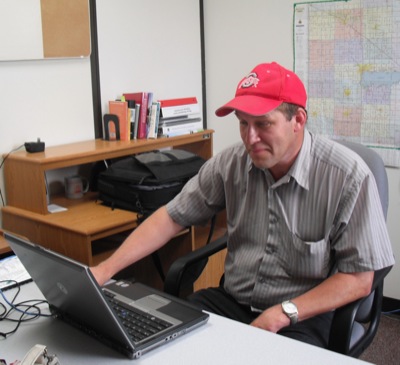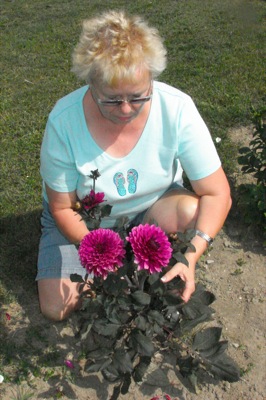Tuesday, August 4th, 2009
New extension educator hired
Jim Hoorman tapped for post in state's No. 1 ag income county
By Nancy Allen

Photo by Nancy Allen/The Daily Standard
Jim Hoorman started as the new OSU Extension educator for Mercer County on Monday. His two main focus areas will be on agriculture environmental management and the business side of farm management. He will split his time 50 percent between Mercer County and extension.
A longtime OSU Extension employee has been named the new extension educator for Mercer County on a part-time basis.
Jim Hoorman started work on Monday and replaces Todd Mangen, who left five months ago after learning the full-time position was being cut due to statewide budget concerns. Hoorman will spend 50 percent of his time in Mercer County and the rest working for OSU Extension on various state, regional and national projects.
He will travel between extension offices in Celina and Lima.
In his new post in Mercer County, he will focus on two main areas: agriculture environmental management particularly related to educating farmers about best management practices that help their bottom line and improve water quality, and farm management as it relates to the business side of agriculture.
"I will still do the more common programming like pesticide application updates and other types of programming, but I'm going to specialize mostly on improving nutrient management," Hoorman said. "This is a pretty hot topic here."
Hoorman was an extension agent between 1987 and 1993 in Defiance and Williams counties. He left extension to work for five years in the private sector for Farmers National Company, managing 17,000 acres on 51 mostly livestock farms across Ohio. He went back to the extension in 1997 and worked on water quality issues at Indian Lake for a few years. After that he worked on several special projects funded through grants, many of them involving poultry manure and related research before getting tapped for the Mercer County post.
Hoorman has master's degrees in business and agricultural economics, along with a bachelor's degree in animal science. He currently is working on his doctorate in environmental sciences, studying the use of cover crops to recycle soil nutrients (nitrogen and phosphorous) and soil compaction.
Hoorman is at the forefront of studies on the agricultural and environmental benefits of using winter cover crops. He routinely speaks on the topic in Ohio and throughout the country. On Wednesday and Thursday he will be the featured speaker at a conference in Pennsylvania talking to state senators, county commissioners, consultants, farmers and agency people. In January he will speak at the national no-till conference in Iowa.
Hoorman has advised and helped farmers in Mercer and Auglaize counties in recent years install cover crops as part of money that came to farmers in the Grand Lake Watershed to help improve water quality. Winter cover crops decrease soil erosion, provide a place to apply manure and reduce nutrient runoff.
"I'll be working on a very simple concept and that is keeping something living and growing on the soil year-round," he said. "The benefits of that include absorption of soil and manure nutrients, improved water infiltration, reduced soil compaction and improved water quality."
In recent months, he applied for two grants totaling almost $1.15 million. The first would help pay farmers to plant winter cover crops to reduce the amount of phosphorous and nitrogen runoff from farmland, and the second would use GPS technology to reduce nutrient loading to the lake. If those grants get approval, he would help implement them and perhaps be able to hire an assistant to help.
Hoorman said due to the state's shrinking budget and a smaller pool of extension educators, counties will have to share employees.
"We are starting to work more as a more specialized team," he said. "If questions are more specialized, I may pass those on to someone else who can better answer them, just like I hope some counties will pass questions on to me."
Hoorman said he doesn't yet have set office hours and many details of his job are still being worked out. He already received two horticulture-related questions on his first day. Hoorman said he eventually hopes to start a master gardeners program in the county to help people with fruit, vegetables and landscaping plant questions. He would need a volunteer willing to head that up.
But his main goal right how is to get out and meet farmers.
"I plan to do a lot of one-on-one teaching and meet farmers and see what their issues are," he said. "I plan to spend a lot of time visiting farmers on their own farms and work with them to solve their problems ... I don't think you can do that in the office."

